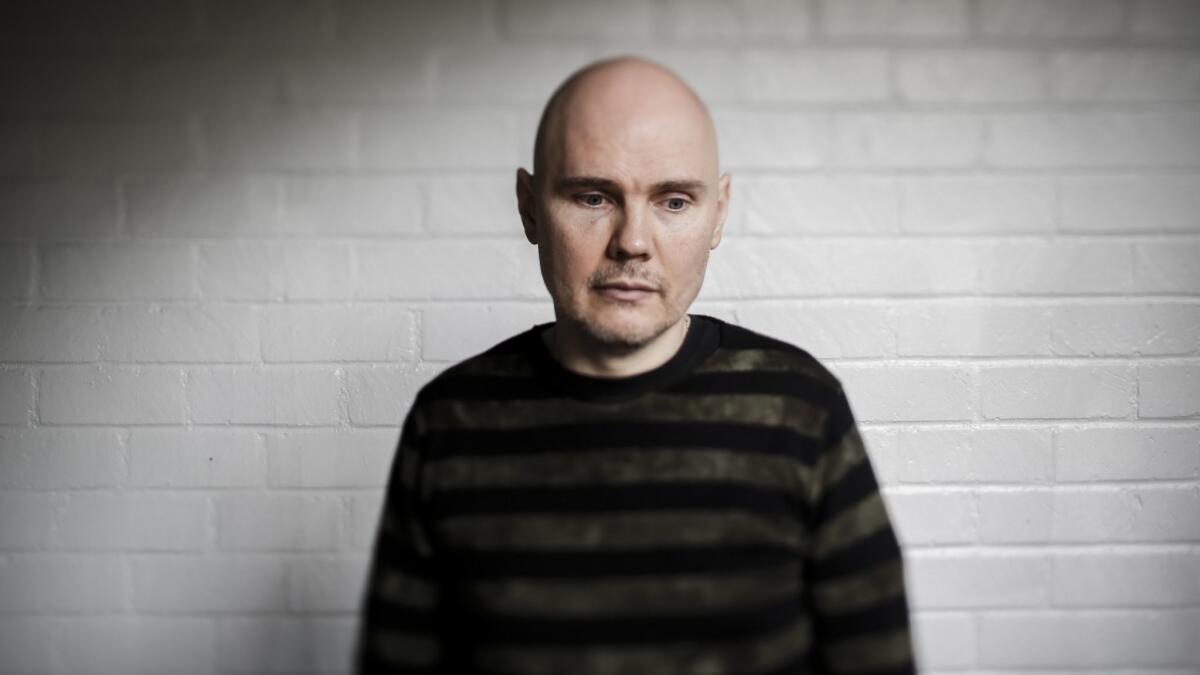Billy Corgan was in a ‘low place’ before Smashing Pumpkins reunited

Any longtime Smashing Pumpkins fan knows it: When the veteran alt-rock band launches its long-awaited reunion tour in July, the shows will hardly mark the first time that frontman Billy Corgan has utilized his most lucrative brand name since the group split nearly two decades ago.
Corgan has steadily worked for years under the Smashing Pumpkins banner, including as recently as 2014, when he made “Monuments to an Elegy” with guitarist Jeff Schroeder and Motley Crue’s Tommy Lee on drums.
Still, this summer’s tour will reconvene three of the four players responsible for such mid-’90s classics as “Siamese Dream” and “Mellon Collie and the Infinite Sadness.” And not only that, but the famously fractious band is enjoying its “happiest time,” at least according to comments Corgan made in a story published Thursday by the New York Times. (One reason to be skeptical: Bassist D’Arcy Wretzky is sitting out the reunion, having said that “any kind of work situation” involving Corgan is “not pretty.”)
If the frontman’s happiness is real, though, how did he get there?
In November, I sat down with Corgan for a conversation at his manager’s office in West Hollywood. He’d just released an acoustic solo album, “Ogilala,” and was in town to perform a series of shows at the Hollywood Forever cemetery.
I’d wanted to speak to him because of something he’d told me in an earlier interview, which was that he’d recorded the upbeat “Monuments to an Elegy” as a trade-off for an another album he had in him.
“This is the be-nice record and the other is the be-not-nice record,” Corgan said. Then he added that the latter project, which he said he’d already begun work on, was actually shaping up to be even nastier than he’d initially thought.
“The be-not-nice is becoming be-really-not-nice,” he said. “I’m totally ready to go there now.”
So what happened? I wondered late last year. Had the be-not-nice record somehow morphed into the tranquil “Ogilala,” which Corgan made with the producer Rick Rubin?
Nope — turns out Corgan never finished that promised blast of negativity.
“I went into it full of vim and vigor,” he told me last year, eager to wage war on hypocrisy and conformity and whatever else was getting this part-time conspiracy theorist hopped up.
But soon he ran out of steam. He started to doubt that anyone cared about what he had to say; nobody was anxiously waiting for the record, he said he discovered.
“And that was a haunting experience,” he said. “I was like, ‘Gosh, is this what my life is now? I’m the one carrying the yoke around for the dead band?’ So I abandoned the record, which was very hard to do, but I did it.
“I was working one day — it was like 2 p.m. — and I turned to my partners at the time and I said, ‘I’m done.’ They said, ‘What do you mean?’ They’re both my friends: Jeff from the band and [producer] Howard Willing, who I’ve worked with since the ’90s. I just said, ‘I’ve got to go home. I can’t do this anymore.’
“So I bummed around the house for a little while. I got depressed. And then I thought: Can I still write a song that I care about? Before that I’d been trying to find some kind of balance in the messaging. There were things I wanted to say, but could I still say them in a way that would attract people? I don’t know. It was a losing formula, which is why I feel reticent to talk about it.
“I took a road trip around America with a professional wrestler and a former vet,” Corgan recalled. “And I found myself singing songs about Civil War battle sites; God knows what I was on about. But I wrote a whole batch of songs and I called Rick thinking he could recommend some bearded young producer out in Topanga. He says, ‘Oh, what’s the music like?’ I describe it and he goes, ‘Well, I’m interested.’
“I literally looked at the phone — like, did Rick just say he was interested in my weird acoustic record? He asked me to send him stuff, so I sent it to him and I crossed my fingers. I was thrilled he was interested, but I was in a vulnerable spot; I’m not sure I could’ve gotten kicked down two more stairs.
“And now I’ve taken this weird risk,” he continued. “If he rejects me, I’m crushed. And Rick’s not a liar — he’s incapable of lying.
“So I sent him the demos, and I waited a month. I got a message from the assistant: ‘He wants to talk to you.’ I got on the phone and he goes, ‘I love it.’ It was like the sun was shining. Wow! This is awesome.”
I told Corgan that he’d never struck me as the type of artist to so openly crave validation from others.
“No, I was in a low place,” he said. “There was a point in my life where I thought I was on top of the world — like, I’ll forever be able to release records and there will be an audience that wants to hear me and come see me play.
“And then here I am, 20 years later, and maybe that’s not so true anymore. That’s a weird place to get to if once you believed you’d never get there. So I just had to get to the next space. And I wasn’t going to lean on the band name to do it; I wasn’t going to get the gang back together and fall into desperation.
“For me, it was: Can I move forward from an organic place? And Rick gave me the courage and the confidence I didn’t have at that moment.”
Twitter: @mikaelwood
More to Read
The biggest entertainment stories
Get our big stories about Hollywood, film, television, music, arts, culture and more right in your inbox as soon as they publish.
You may occasionally receive promotional content from the Los Angeles Times.










